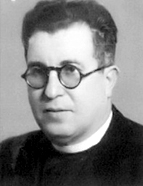

At the age of just eleven, António da Silva Rego, one of the fourteen children of Joaquim da Silva Rego and Bernardina de Freitas, travelled to Macau to join the St Joseph's Seminary, invited by his cousin and the rector of the institution, António José Gomes. At the age of twenty-two, he completed his studies, taught at the same seminary, and was ordained by Bishop José da Costa Nunes, Bishop of Macau and Patriarch of the Indies (R. Gulbenkian, "Elogio... [Eulogy...]", 1991, p. 148; A. Corral, "A Sociedade... [Society...]", p. 105.). In 1928, he was assigned by the latter on a mission to Singapore, where he remained for about ten years, serving as the civil parish priest of St Joseph's Church and director of St. Anthony's Boys School. It was no coincidence that Roberto Gulbenkian referred to António da Silva Rego as the "Father Master of the Orient" (Idem, p. 163). The first years of his youth spent in the East would prove decisive in shaping the primary focus of study that Silva Rego would pursue for the rest of his life: the history of Portuguese missionisation and patronage in Asia (Idem, p. 149; J. Mendes de Almeida, "A minha homenagem..." [My Tribute...], 1991, p. 16). He travelled to Europe, again at the behest of the Bishop of Macau, to attend the Catholic University of Louvain, where he completed a degree in History ( Sciences Historiques ). As noted by a member of his team later, with the outbreak of the Second World War and during the German invasion of Belgium, Silva Rego was accused of espionage and temporarily detained while attempting to escape (E. Trigo de Sousa et al, "Prof. António da Silva Rego...", 1991, pp. 252 and 251). In 1942, he returned to Portugal, settling in Lisbon in a flat so small that he had to convert the coffee shop Brasileira into a sort of living room to receive guests (R. Gulbenkian, ibidem, p. 151). In 1946, at the age of 41, he was appointed as a regular professor in the Curso de Altos Estudos Coloniais [Advanced Course in Colonial Studies] at the invitation of Marcelo Caetano. He became responsible for the subjects of Modern Colonisation and Missionology at the Escola Superior Colonial [Higher Colonial School], which later became the Instituto Superior de Estudos Ultramarinos [Higher Institute of Overseas Studies] (ISEU - 1954-1961), followed by the Instituto Superior de Ciências Sociais e Política Ultramarina (Higher Institute of Overseas Social Sciences and Politics) (ISCSPU - 1962 and 1976), and currently the Instituto Superior de Ciências Sociais e Políticas (Higher Institute of Social and Political Sciences) (ISCSP) (Idem, p. 151). Silva Rego served on the management and eventually became the full professor, remaining at the institution until 1975, when he retired.
This work is financed by national funds through FCT - Foundation for Science and Technology, I.P, in the scope of the projects UIDB/04311/2020 and UIDP/04311/2020.
